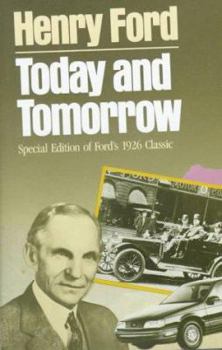Today and Tomorrow (Corporate Leadership)
Select Format
Select Condition 
Book Overview
Winner of the 2003 Shingo Prize
Henry Ford is the man who doubled wages, cut the price of a car in half, and produced over 2 million units a year. Time has not diminished the progressiveness of his business philosophy, or his profound influence on worldwide industry. The modern printing of Today and Tomorrow features an introduction by James J. Padilla, Group Vice President, Ford North America. It also includes an enhanced selection of photos illustrating the processes and facilities Ford covers in the text. Taiichi Ohno acknowledged that a key stimulus to JIT was his close reading of this book. Today, these same ideas are re-emerging to revitalize American industry in new ways.
"I, for one, am in awe of Ford's greatness. I believe Ford was a born rationalist -- and I feel more so every time I read his writings. He had a deliberate and scientific way of thinking about industry in America. For example, on the issues of standardization and the nature of waste in business, Ford's perception of things was orthodox and universal."-- Taiichi Ohno
Customer Reviews
Rated 5 starsMind-blowing! Must-have item!
Being employed in the car industry, finding a book like this is particularly useful as I can relate to a lot of what HF has written. What's really surprising is, he writes of things which are rational and based on common sense, but many don't seem to speak about or even practice in their daily work! Much of what is today attributed to Toyota was common practice at Ford factories in the 1920s! Ford was a world leader and pioneer...
1Report
Rated 5 starsThe Begining of Lean
If you would like to know who really started the Lean Journey look no further than Henry Ford
1Report
Rated 4 starsAn historical document of our contemporary
There are different "uses" for this book - some I'd recommend, and others not. I WOULD NOT recommend this book for it's insights on - Economics: Ford explains a classic industrial notion that a company paying employees more will increase its sales because employees will buy more company product. Not only is this a false assumption of employee behavior, it also only approaches plausibility for very large consumer product...
0Report
Rated 5 starsThe book that inspired Taiichi Ohno
This is an outstanding book for those folks in manufacturing who are starting out on their "Lean" journey. The book teaches the uninitiated an original thinker's way of recognizing "waste" in manufacturing, and often, how to deal with that waste. Taiichi Ohno took a "shipload" of this book with him to Japan in the '50s and made sure that every Toyota engineer read the book. The rest is history as to how Toyota packaged this...
1Report














